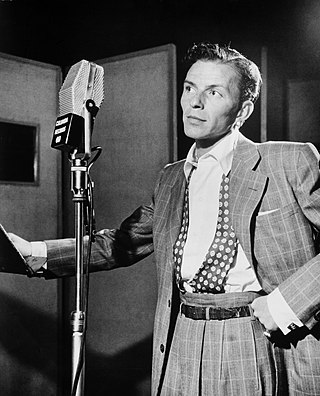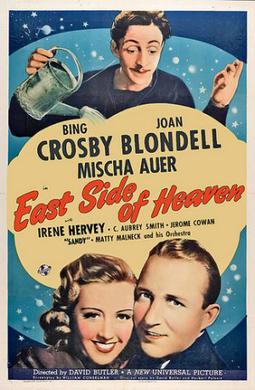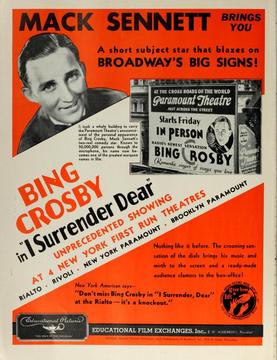
Harry Lillis "Bing" Crosby Jr. was an American actor, singer, television producer, television and radio personality, and businessman. The first multimedia star, he was one of the most popular and influential musical artists of the 20th century worldwide. Crosby was a leader in record sales, network radio ratings, and motion picture grosses from 1926 to 1977. He was one of the first global cultural icons. Crosby made over 70 feature films and recorded more than 1,600 songs.

Mack Sennett was a Canadian-American producer, director, actor, and studio head who was known as the "King of Comedy" during his career.

A crooner is a singer who performs with a smooth, intimate style that originated in the 1920s. The crooning style was made possible by better microphones that picked up quieter sounds and a wider range of frequencies, allowing the singer to access a greater dynamic range and exploit the proximity effect. This suggestion of intimacy was supposedly wildly attractive to women, especially a youth subculture known at the time as "bobby soxers". The crooning style developed among singers who performed with big bands, and reached its height in the 1940s to late 1960s.

Educational Pictures, also known as Educational Film Exchanges, Inc. or Educational Films Corporation of America, was an American film production and film distribution company founded in 1916 by Earle Hammons (1882–1962). Educational primarily distributed short subjects; it is best known for its series of comedies starring Buster Keaton and the earliest screen appearances of Shirley Temple (1932–34). The company ceased production in 1938, and finally closed in 1940 when its film library was sold at auction.

"Where the Blue of the Night (Meets the Gold of the Day)" was the theme Bing Crosby selected for his radio show. It was recorded in November 1931 with Bennie Krueger and his Orchestra. The song was featured in a Mack Sennett movie short starring Bing Crosby. Crosby recorded the song on several occasions starting with the November 23, 1931 version with Bennie Kruger and his Orchestra. He next recorded it on July 20, 1940 with The Paradise Island Trio. On July 17, 1945 he recorded it with John Scott Trotter and his Orchestra and his final recording was on April 21, 1954 with Buddy Cole and his Trio for his Musical Autobiography set.

Bing: A Musical Autobiography was Bing Crosby's fourth Decca vinyl LP, recorded and released in 1954.

Toby Wing, "Toby" being an old family nickname, was an American actress and showgirl, once called "the most beautiful chorus girl in Hollywood".

Harry Barris was an American popular singer and songwriter. He was one of the earliest singers to use "scat singing" in recordings. Barris, one of Paul Whiteman's Rhythm Boys, along with Bing Crosby and Al Rinker, scatted on several songs, including "Mississippi Mud," which Barris wrote in 1927.
"Wrap Your Troubles in Dreams" (also known as "Wrap Your Troubles in Dreams (and Dream Your Troubles Away)") is a popular song written by Harry Barris with lyrics by Ted Koehler and Billy Moll, published in 1931.
"Snuggled on Your Shoulder (Cuddled in Your Arms)" is a popular song with music by Carmen Lombardo and lyrics by Joe Young, published in 1932.

One More Chance is a 1931 Educational-Mack Sennett Featurette starring Bing Crosby and directed by Mack Sennett. This was the second of the six short films Crosby made for Sennett and which helped launch his career as a solo performer. This film is notable for Crosby first singing on film his classic hit "Wrap Your Troubles in Dreams" which is sung to a bevy of giggling overweight Native American maidens who gradually close in on him. He also sings "Just One More Chance" which topped the various charts of the day in 1931.

"At Your Command" is a 1931 song recorded by Bing Crosby on June 24, 1931 with piano accompaniment by Harry Barris. The lyrics were written by Bing Crosby and Harry Tobias, The music was composed by Harry Barris.

East Side of Heaven is a 1939 American musical film directed by David Butler and written by William M. Conselman and James V. Kern. The film stars Bing Crosby, Joan Blondell, Mischa Auer, Irene Hervey, C. Aubrey Smith, Robert Kent and Jerome Cowan. Filming took place in Hollywood from January 13 to March 7, 1939. The film was released on April 7, 1939, by Universal Pictures and had its New York premiere at Radio City Music Hall on May 4, 1939. This was another independent production in which Crosby had a financial interest.

Crosby, Columbo, and Vallee is a 1932 Warner Bros. Merrie Melodies cartoon short directed by Rudolf Ising. The short was released on March 19, 1932. It lampoons the popularity of crooners among young women, with popular crooners Bing Crosby, Russ Columbo, and Rudy Vallée being the namesake of the film.

Please is a 1933 short musical comedy film directed and produced by Arvid E. Gillstrom. It stars Bing Crosby as himself along with Vernon Dent and Mary Kornman.

I Surrender Dear is a 1931 Educational-Mack Sennett Featurette starring Bing Crosby and directed by Mack Sennett. This was the first of the six short films Crosby made for Sennett and which helped launch his career as a solo performer.

Dream House is a 1931 Educational-Mack Sennett Featurette starring Bing Crosby and directed by Del Lord. This was the third of the six short films Crosby made for Sennett and which helped launch his career as a solo performer.

Billboard Girl is a 1932 Educational-Mack Sennett Featurette starring Bing Crosby and directed by Leslie Pearce. This was the fourth of the six short films Crosby made for Mack Sennett and which helped launch his career as a solo performer.

Blue of the Night is a 1933 Mack Sennett Star Comedy directed by Leslie Pearce and starring Bing Crosby. It was the last of the six short films Crosby made for Mack Sennett and which helped launch his career as a solo performer.
















